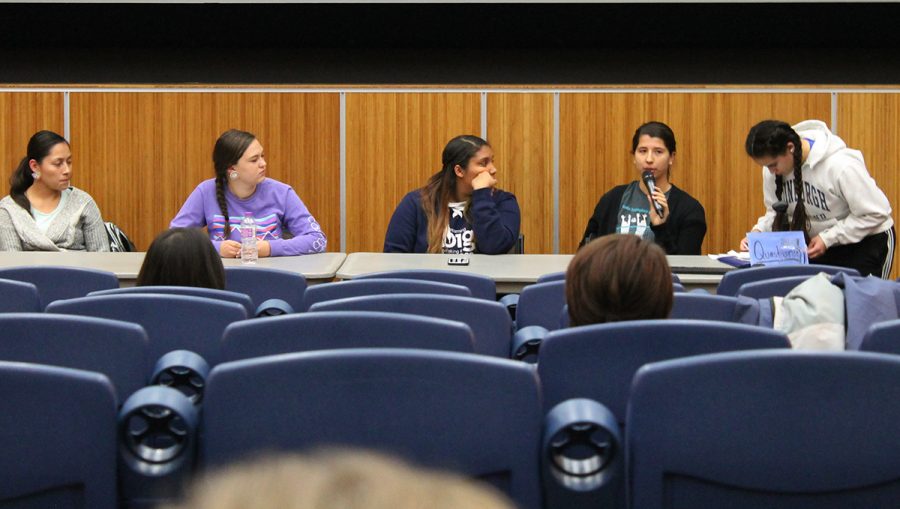Inter-Tribal Student Council hosts biannual Indian Student Panel
Panel addresses their experiences and concerns for Native American students on campus
Members of the Inter-Tribal Student Council answered anonymous questions from the audience at the biannual Indian Student Panel Tuesday. (Sydney Purpora)
November 30, 2016
UW-Eau Claire’s Inter-Tribal Student Council (ITSC) held their biannual Indian Student Panel Tuesday in the Woodland Theater.
The event gave people a chance to learn more about the American Indian culture, said Savannah Rigert, a fifth-year Native American studies and social work student, and the president of ITSC, by asking five members of the council anonymous questions.
“I think a lot of people in day-to-day find it awkward to ask these kind of questions even though people really want to know,” Rigert said. “It helps the education process of getting people to understand what it is like.”
The five panelists involved are all active ITSC members: Rigert; Tressa Lange, a freshman undeclared student; Whisper McDew, a junior liberal studies student; Mia Penzkover, a freshman undeclared student and Gabby White, a sophomore chemistry student.
One of the first questions addressed students’ best and worst experiences on campus. In response, the majority agreed the worst experience they had was when President-elect Donald Trump spoke on campus and the best was the pow-wow.
“My worst experience here was actually having someone say a racist remark to me,” White said. “Which of course was after all of the Trump stuff.”
The questions asked by the audience ranged from personal topics like dating people of other ethnicities to how they feel regarding campus in relation to specific cultural traditions.
Rigert reminded the audience they will not criticize anyone for the questions they ask and they will answer them with honesty.
Connecting back to their culture, the members were asked if they felt their native language played a role in shaping who they are; Lange responded by reflecting on her home life.
“Where I grew up, there are currently only seven fluent speakers (of the native language) and they are all over the age of 70 and therefore, they are all going to pass away soon,” Lange said. “If they pass away and we don’t learn the language, then our sovereignty gets taken away from us and we aren’t really a culture anymore.”
Rigert said having an organization like ITSC where she can connect with other American Indian students helps her through her studies. The group meets twice a week to discuss upcoming events and check in on each other.
One of the final questions asked was what changes they would like to see at the university level. Rigert said overall she would like to see the Equity, Diversity and Inclusivity (EDI) Implementation Team make more noticeable changes on campus.
As an example, she said requiring more diversity classes and informing current and prospective students more about the university’s history with the Native American culture would be a step in the right direction.
The panel ended with the members opening the floor for more audience questions. As attendees exited, they were given the chance to donate money for supplies being sent to aid the Standing Rock Sioux Tribe in North Dakota.
Looking back on the Native American Heritage Month festivities over the years, Rigert said this year was the busiest in a long time. Holding at minimum two events per week, she said they went all out and incorporated a variety of new events.
Since the panel is the last event of the Native American Heritage Month until the following Indian Student Panel next spring, the ITSC will be showing American Indian movies during the spring 2017 semester to remind students of the diversity on campus.
More information about the ITSC and their upcoming events can be found here.

